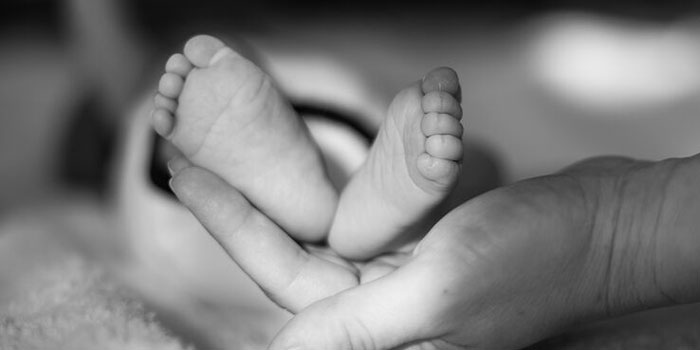Australian mother Teresa Streckfuss learned that her son had anencephaly while he was still in the womb. The doctor who made the diagnosis via ultrasound tried to dehumanize the baby as soon as he discovered his condition. Streckfuss recalls:
[The doctor] then took some of his own measurements. Eventually he turned to us and said, “Now, there is a problem with the [pause] foetus. We’ll get someone down from obstetrics to explain it all to you…” I knew from his pause that he would’ve said baby if there had been nothing wrong.
Often, a preborn child is called a “baby” when she’s wanted, and a “fetus” when she isn’t. Since the doctor assumed that Teresa would want to abort, her “baby” became a “fetus.” This dehumanizing language allows the doctor and the mother to distance themselves from the baby and deny his humanity.
But Teresa and her husband never considered abortion. They named their child Benedict and resolved to spend as much time with him as they could. Teresa writes:
I don’t think I can possibly tell you how beautiful Benedict was, or how sweet he smelled, or how much I wish those hours were frozen in time. He was so alive! He cried out, made facial expressions, wriggled…. His face was so sweet; he looked just like our other children at birth. … We marveled at how perfect he was, his soft cheeks, his feet and hands, and his sweet little face.
Even the hospital staff was affected by Benedict’s short life. Teresa says, “Some of them cried, some prayed, many of them patted my head or my hands while Benedict was being born.”
READ: ‘I miss those kicks’: Remembering twin with anencephaly brings healing
The hospital staff may have been forever changed by the small amount of time they spent with Benedict. Witnessing Benedict’s birth and being there throughout his short life, seeing the love his parents had for him, could have changed their views on abortion in cases of fetal anomaly.
The whole family met Benedict, including his siblings.
Benedict had lots of visitors. He met Cecilia and Sebastian [his sister and brother] both sets of grandparents, aunties and uncles, cousins, his godmother, and another priest friend. After about 10 PM we had him to ourselves. It was so nice to have the time that was left with just the three of us…. We both sang to him and Mark read to him, but mainly we just held him.
Benedict died 24 hours after he was born, and Streckfuss family held a funeral for him. And Benedict’s mother has no regrets.
I miss him so much, but I wouldn’t trade his life for anything. And while this has been the most painful experience I’ve ever had to endure, it’s probably been the most beautiful as well. Benedict spent his whole life in the arms of people who loved him; who could ask for a better life?
Teresa had another healthy baby and then, tragically, another child with anencephaly. They named the baby girl Charlotte, and she lived for six days after birth. Charlotte’s personality was unique and different from Benedict’s.
She was quiet and peaceful, and seemed so much smaller and more fragile than Benedict … Charlotte reacted to her surroundings much more than Benedict… Charlotte reacted to the camera flash, she tracked light with her eyes, she startled at loud noise, she had ticklish hands and feet…
When she died on Saturday, it was at home with both of us there, holding her, loving her, and actually letting her go. After six wonderful, eventful days surrounded by love and prayers, and those of our friends, family and thousands of strangers across the world, she left our arms for heaven.
READ: Mom chooses life for baby with anencephaly: ‘She can feel our love’
Asked why she and her husband decided not to abort their babies, Teresa answered:
It’s about love! It’s about our babies! … Causing them to die earlier will only take from us the beautiful experience of knowing and loving them… We wouldn’t wish away the time we had with Benedict, or Charlotte, just the save us the pain of losing them…
Someone asked us after Benedict died, “Was it worth it?” Oh, yes! For the chance to hold him, and see him, and love him before letting him go. For the chance for our children to see that we would never stop loving them, regardless of their imperfections? For the chance to give him everything we could? Oh, yes.
Had Teresa and her husband aborted, they would never have had time to get to know their children. They would’ve carried around the guilt of ending their babies’ lives. It is unlikely that they would have experienced the peace they now share.
Source: Teresa Streckfuss “It’s All about Love” in Melinda Tankard Reist Defiant Birth: Women Who Resist Medical Eugenics (North Melbourne, Australia: Spinifex, 2006) 92, 96 – 100, 106, 109 – 110
“Like” Live Action News on Facebook for more pro-life news and commentary!







